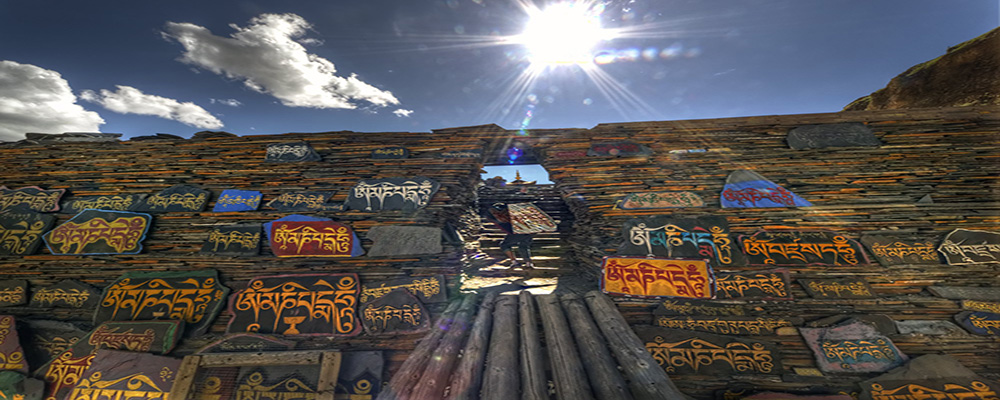
This huge building is entirely made of flat stones engraved with mantras and prayers. Province of Myniak, Eastern Tibet. Photograph by Matthieu Ricard.
Excerpts from The Enlightened Vagabond, the biography of the 19th century hermit and spiritual master Patrul Rinpoche.
Patrul on Having Things
Patrul often pointed out the uselessness of worldly concerns and the inherently unsatisfactory nature of samsara. In particular, he emphasized the never-ending problems that came with owning possessions, saying, “Don’t you get it? If you’ve got money, you’ve got money problems. If you have a house, you have house problems. If you have yaks, you have yak problems. If you have goats, you have goat problems!”
Patrul and the Widow
While Patrul was traveling on foot across the vast plateaus of Golok, north of Dzachukha, he encountered a woman, mother of three, whose husband had just been killed by a changthang dremong, the huge bear from the Tibetan steppes, a beast much more dangerous than the dremong of the forests. Patrul asked the woman where she was going, and she told him she was headed to Dzachukha with her three children to beg for food, as the loss of her husband had left them destitute.
Then she began weeping.
“Ka-ho! Don’t worry!” said Patrul. “I’ll help you. I’m going to Dzachukha, too. Let’s travel together.”
She agreed, and so they walked together for many days. At night, they slept outside beneath the sky. Patrul would nestle one or two of the children into the folds of his sheepskin coat, and the woman would similarly hold the rest. During the day, Patrul would carry one child on his back, the woman would carry the second, and the third would walk along behind.
When the woman begged in villages and nomad camps they passed, Patrul would beg right alongside her, asking for tsampa (barley flour), butter, and cheese. Travelers they met assumed they were a family of beggars. No one—least of all the newly widowed woman—guessed the identity of her shabby companion. Eventually, they reached Dzachukha. That day the woman went off on her own to beg for food, and so did Patrul. In the evening, when they returned, the widow noticed that Patrul had a dark look on his face. The woman asked, “What’s wrong? You seem annoyed.”
Patrul brushed it off, saying, “It’s nothing. I had a task to accomplish, but the people here won’t let me finish it. They’re just making a big fuss about nothing.”
Surprised, the woman asked, “What work could you have around here?”
Patrul replied, “Never mind, let’s just go.”
They came to a monastery on the side of a hill, where Patrul stopped. He turned to the widow and said, “I have to go inside. You may come, too, but not right now. Come after a few days.”
The woman said, “No, let’s not separate; let’s go in together. Until now, you have been so kind to me. We could get married. If not, let me at least stay at your side. I’d benefit from your kindness.”
“No, that won’t do,” replied Patrul, adamant. “Up to now, I’ve done my best to help you, but the people here are troublemakers. We mustn’t go in together. Come back in a few days; you’ll find me inside.”
So Patrul went up the hill to the monastery while the widow and her children stayed at the bottom of the hill, begging for their food.
As soon as he was inside the monastery, contrary to his usual habit of refusing offerings, Patrul ordered that any provisions offered to him should be kept and put aside for a very special guest he was expecting who would be needing provisions.
The next day, everyone in the valley had heard the news of the great lama’s return.
“Patrul Rinpoche has come!” people said. “He’ll be giving teachings on The Way of the Bodhisattva!”.
Men and women, young and old, monks and nuns, male and female lay practitioners, everyone went hurrying to hear the great Patrul Rinpoche. People began to gather into a huge crowd, bringing along horses and yaks that carried their tents and provisions.
When the widow heard the news, she was thrilled, thinking, “A great lama has come! This will be my chance to make offerings and request prayers on behalf of my late husband!”
Along with everyone else, she climbed up to the monastery, bringing along her three fatherless children.
The poor widow and her family had to sit at the far edge of the large crowd to hear Patrul’s teachings. She was so far away that she could not see his features clearly. At the end of the teachings, like everyone else, she stood on a long line, waiting to receive the great lama’s blessing.
Eventually, she moved up in the long line till at last she came close enough to see that the great lama, Patrul Rinpoche, was none other than her shabby, kind, faithful traveling companion.
Moved by both devotion and amazement, she approached Patrul, saying, “Forgive me for not knowing who you were! You are like the Buddha in person! Forgive me for making you carry my children! Forgive me for asking you to marry me! Forgive me for everything!”
Patrul brushed off her apology lightly, saying, “Don’t give it a second thought!”
Turning to the monastery attendants, he told them, “This is the very special guest I’ve been expecting! Please bring all the butter, cheese, and provisions that we have been setting aside especially for her!”
Excerpted from Matthieu Ricard’s book, The Enlightened Vagabond: The Life and Teachings of Patrul Rinpoche, Shambhala Publications. The Enlightened Vagabond, a biography of the famous hermit and spiritual master Patrul Rinpoche, recently translated from the Tibetan, includes excerpts from two biographies written by his direct disciples and over a hundred anecdotes gathered from the oral tradition, as well as a few teachings written by this remarkable 19th century master.